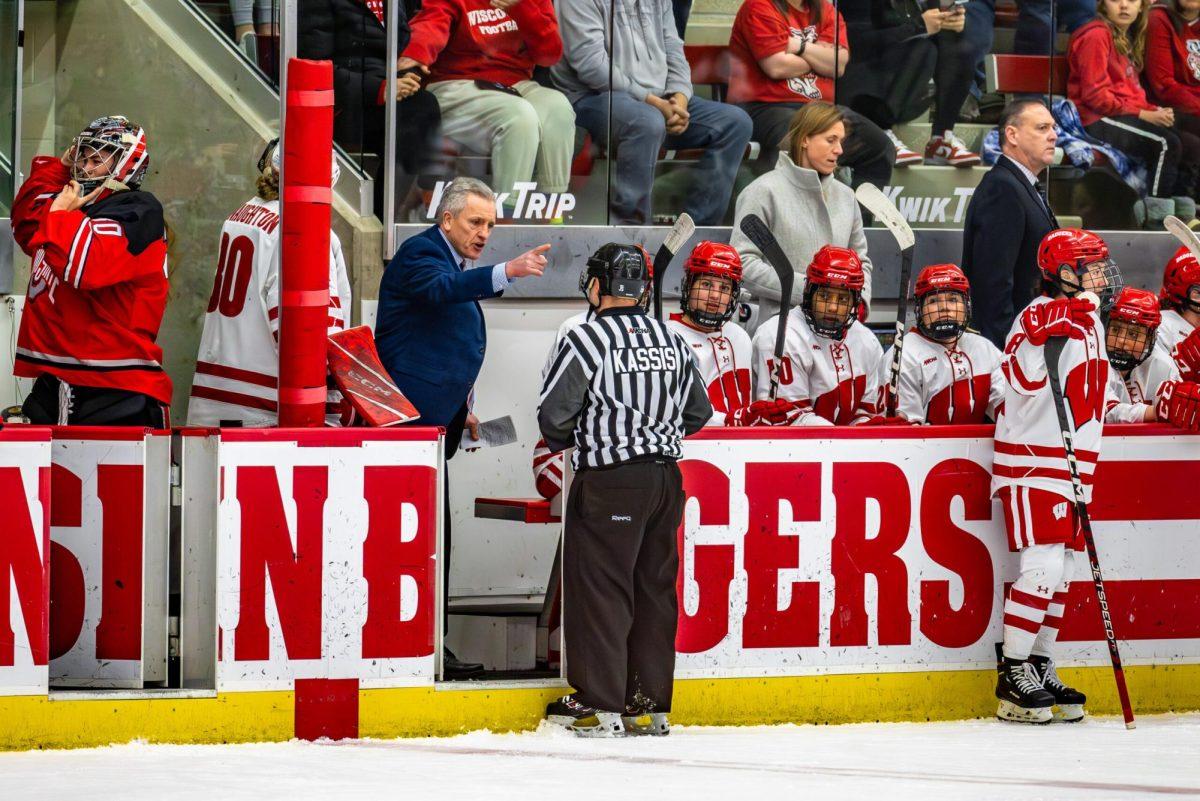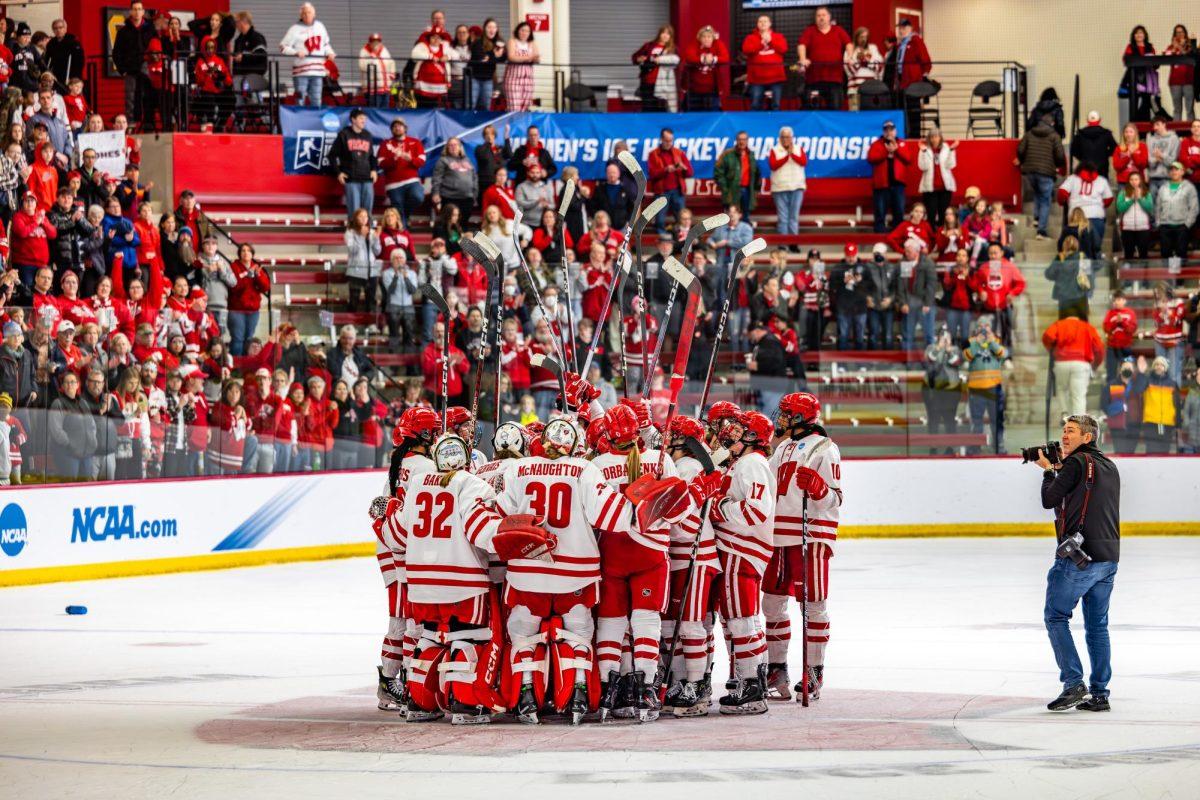University of Wisconsin athletics look a bit different during the summer. The track teams ramp up with the NCAA Championships in May to prepare for the USA Olympic Trials in June. Many teams, like football, primarily go through strength training workouts. With a little down time, every program opens its doors for summer camps.
Every summer, UW offers over 50 camps to a wide range of ages and skill levels. Some campers are participating in a sport for the first time, while others are there hoping to catch the eyes of Badger coaches and trainers.
The Badger Soccer Day Camp, run by the women’s soccer program, is open to kids as young as five years old and as old as 12.
For the youngest kids, attending camp is more about having fun and getting them excited about soccer. They meet UW players, like Emma Jaskaniec and Liv Curry, play games like Simon Says and have fun at the s’mores and movie nights the instructors put on. Older campers get a more in-depth look at the game of soccer.
“We’re talking more about ball striking and what part of the foot you’re using … really delving into technique,” associate head coach of women’s soccer Tim Rosenfeld said.
Instructors cover technical concepts like patterns of play and defense — things Rosenfeld said players never really stop learning.
Perhaps most importantly, the camps are a way to get kids interested in athletics in general. Volleyball associate head coach Gary White believes sports can be immensely impactful to individuals. White and the volleyball program run their camps much in the same way the women’s soccer program does. They offer many camps, from those introducing kids to a sport to practicing at the highest level.
As with soccer, volleyball campers get to meet and interact with current Badgers. It might result in some comical scenes, like a four year old peering up at the 6-foot-9 Anna Smrek or the 6-foot-7 Carter Booth, but it’s a way for aspiring athletes to see their role models.
Camp goals are much the same across all levels.
“When we create our activities and our camps, we look for growth,” White said. “We look at how kids grow with what they’re looking to do.”
That can mean overcoming initial challenges in setting a volleyball or continuing to develop in a sport a camper has played for years. Every camper, no matter their level, will learn about leadership, communication and the normal struggles that come with athletics.
While things will look different for each age group and skill level, White says they adapt their own training at UW to fit everyone’s needs with a foundation set of skills.
“[Campers can] aspire to be a better player and person and — if you want to play at the highest level — [learn] what it takes to get to that position,” White said.
The camps are a good gig for the coaches and players, too. While being able to mesh with their teammates, players can partake in a rewarding environment helping the younger generation of players.
Some campers may step foot onto the grass at Goodman Softball Complex feeling nervous. They’re surrounded by potentially new faces, not to mention the Badger players and coaches. Once things get going, they learn they’re in a welcoming environment, with those possibly scary at first UW players becoming coaches and mentors. Many leave camp with big smiles.
“To see that growth in the short four days they’re with them is really rewarding for our players,” Rosenfeld said.
Former soccer campers are always invited to a special Camper Night game in the fall. The stands at McClimon Soccer Complex are often full and peppered with signs supporting the players, who were their coaches at camp.
It represents the chemistry and long-lasting relationships that are built within a couple of days.
“From our standpoint, making that connection with the community is essential,” Rosenfeld said. “We tell them, ‘there’s future Badgers in here.’”
Sometimes, those campers become future UW athletes. They’ll often continue to attend UW camps, like one of the Summer College ID camps. Students entering grades 8-12 are eligible to sign up for a better understanding of what it takes to play soccer at the collegiate level. Some campers are invited by the UW coaching staff. Even if campers don’t receive an invite, Rosenfeld ensures those campers can show off their skills.
Soccer campers get a taste of Badger soccer through practices and scrimmages, interacting with UW players and touring facilities on campus. It’s no easy task, but it’s a way the Badger program has been able to recruit some players. It’s quite similar with volleyball.
The Badger Camps, also available for eighth to twelfth graders, are a preview into what practice as a Badger would look like.
“It’s all adapted directly from the things that we train in our gym with our players here,” White said about the techniques and training.
A couple of years ago, White and the volleyball instructors began supplementing the technical work with off-court sessions. Volleyball campers learn how to watch film with current Badgers and discuss leadership, communication and confidence with UW coaches. They even get to ask current Badgers whatever questions they’d like, seeing how high-performing athletes think.
When it’s all over, every camper receives a post-camp survey.
“What we’re looking for is feedback to find, ‘did you learn something while you were here?’ And that’s an important metric for us,” White said.
Many campers, especially those at the Badger Camps, continue to play into the fall — if not year-round. It’s not possible to follow them to every match, but White hopes to leave them with something they’ll remember.
Every camper has a chance to explore more of Madison. They’ll become familiar with the facilities they practice in, but they also have opportunities to see what campus is like in the most beautiful time of the year.
Exploring campus isn’t just reserved for the players either.
“We tell the parents, ‘Go enjoy the terrace while your kids are at camp,’” White said.
As it draws closer to the summer, some camps are filling up. Prospective campers can navigate to uwcamps.com to learn more about availability and scheduling.












